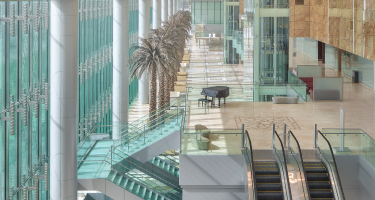Our Doctors
Meet all our doctors at Cleveland Clinic Abu Dhabi.
View Doctors

Diagnosis & Treatment of Parkinson’s Disease
We offer a range of advanced, cutting-edge treatments for Parkinson’s disease and movement disorders. A clinical diagnosis is first made by reviewing a patient’s history and performing a neurological exam. The severity and stage of the condition are also assessed. Our team will then discuss your individual needs and the most appropriate treatment for you.
We are the only center in the UAE to offer all treatment modalities for patients with early or late stages of Parkinson’s disease. Treatment with medication for Parkinson’s disease is effective and can help improve movement symptoms. Alongside medical and surgical treatments, patients require an holistic approach to their care, and we are supported by our rehabilitation team which includes physical therapists, speech therapists and occupational therapists, who are specialized in Parkinson’s disease and other movement disorders.
Treatment options for Parkinson’s disease include:
Deep Brain Stimulation
Deep brain stimulation (DBS) is an advanced, surgical procedure that involves implanting electrodes into targeted areas of the brain. The electrodes deliver electrical impulses via a type of pacemaker device (DBS is referred to as ‘the pacemaker for the brain’). The electrical pulses block or change the abnormal activity in the brain that cause the symptoms of Parkinson’s.
Cleveland Clinic Abu Dhabi was the first center in the UAE to perform DBS and has since performed the highest number of DBS surgeries in the UAE.
Continuous subcutaneous infusion therapy
A novel continuous subcutaneous infusion therapy (called Vyalev or Produodopa) is now available at Cleveland Clinic Abu Dhabi. The FDA-approved treatment provides continuous 24-hour control of Parkinson’s disease symptoms through subcutaneous delivery of levodopa-based therapy, which increases dopamine levels in the brain. The treatment ensures steady symptom relief, addressing the challenges of fluctuating symptoms often seen with oral medications.
Cleveland Clinic Abu Dhabi is the first hospital in the region offering this state-of-the-art treatment.
Levodopa Carbidopa Intestinal Gel (DUOPA) Pump Therapy
Levodopa-Carbidopa is the most effective medication for Parkinson’s disease. Duopa infusion delivers Levodopa-carbidopa in gel form through a small hole (called a ‘stoma’) in the stomach wall to a tube in the intestine. A pump then delivers Duopa directly to the intestine through this tube, delivering medication in a continuous fashion throughout the day which helps to reduce fluctuations significantly, giving the patient control of their symptoms throughout the day.
Advanced treatment for advanced Parkinson’s disease put patient back in the driving seat
Apomorphine Injections and Infusion Pump
Apomorphine is a dopamine agonist medication that helps to control symptoms of Parkinson’s disease. It is delivered via injection under the skin. The medication works very quickly, but the effect of the medication lasts only 60-90 minutes. Therefore, apomorphine injections can be used as emergency treatment to treat sudden ‘off’ states. Continuous delivery of the medication is possible using an apomorphine infusion pump which is delivered by a needle placed under the skin.
Botulinum toxin treatment/Chemodenervation clinic for dystonia and other movement disorders
Chemodenervation refers to the use of Botulinum Toxin (botox) in treating several neurological conditions. Botulinum Toxin is a product formed by bacteria Clostridium botulinum and in a purified form is used to treat many neurological conditions, such as dystonia, spasticity (stiffness in muscles), excessive drooling of saliva, excessive sweating, tremor (shaking) conditions such as Parkinson’s disease, essential tremor and dystonic tremor.
There are several types of dystonia, each with different symptoms:
There are many other conditions that can be effectively treated with careful botulinum toxin injections, with the effects lasting from 3 to 6 months.
We are the first center in the UAE to offer electromyogram (EMG) guided injections for complicated movement disorders, performed by our American board-certified movement disorder neurologist. We also have a team of neurologists who perform botulinum toxin for spasticity and headache conditions.
Our multidisciplinary team of experienced caregivers work together to provide the best possible treatment outcomes for patients. Caregivers at the center include: